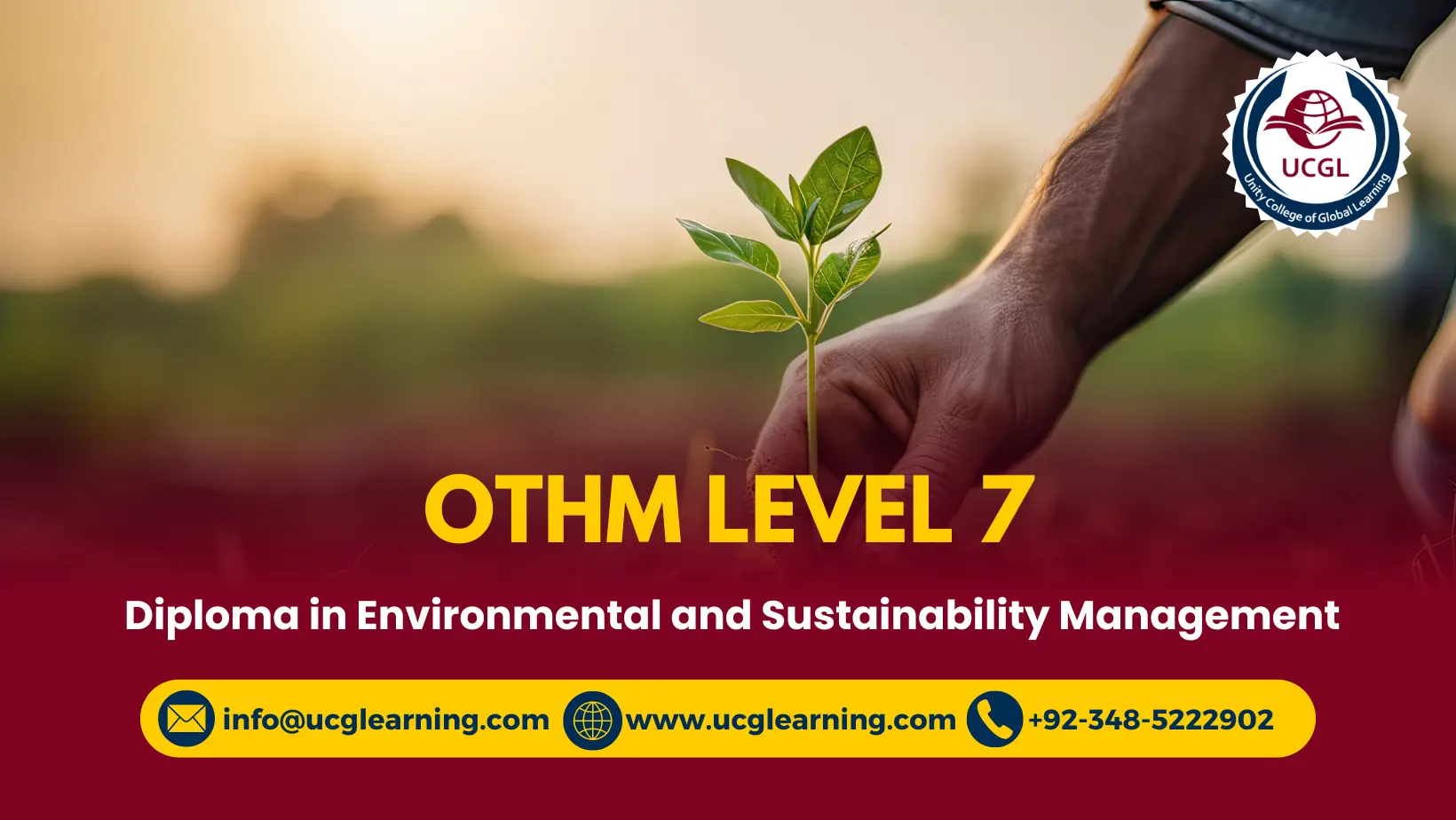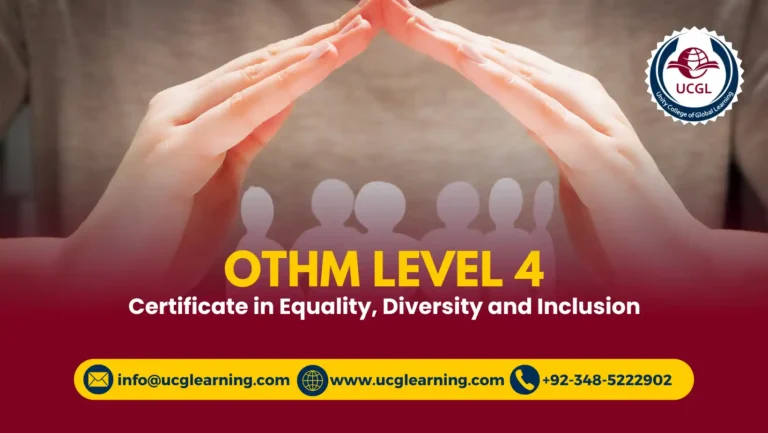OTHM Level 7 Diploma in Environmental and Sustainability Management
In an era where environmental stewardship and sustainability are paramount, the OTHM Level 7 Diploma in Environmental and Sustainability Management stands as a beacon for professionals dedicated to making a positive impact on our planet. This diploma equips individuals with advanced skills and knowledge to lead initiatives that promote environmental conservation, sustainable practices, and corporate social responsibility.
Course Introduction
The OTHM Level 7 Diploma in Environmental and Sustainability Management is designed to address global challenges related to climate change, resource depletion, and environmental degradation. Participants explore strategies for integrating sustainability into organizational practices, fostering innovation, and driving positive environmental outcomes.
Course Benefits
- Strategic Sustainability Leadership: Develop skills to lead sustainability initiatives and integrate environmental considerations into organizational strategies.
- Environmental Stewardship: Gain expertise in environmental management practices, conservation strategies, and sustainable development principles.
- Corporate Social Responsibility: Implement CSR initiatives that enhance organizational reputation and contribute to societal well-being.
- Regulatory Compliance: Navigate complex environmental regulations and standards to ensure legal compliance and ethical business practices.
- Career Advancement: Enhance career prospects with a globally recognized qualification in environmental and sustainability management.
Course Study Units
- Fundamentals of Sustainability (20 Credits)
- Environmental Science and Energy Transition (20 Credits)
- Environmental Management in Organisations (20 Credits)
- Research Methods (20 Credits)
Learning Outcomes
Fundamentals of Sustainability (20 Credits)
- Sustainability Principles: Understand the fundamental principles and concepts of sustainability, including ecological integrity, social equity, and economic viability.
- Sustainable Development Goals (SDGs): Explore the United Nations Sustainable Development Goals (SDGs) and their implications for global sustainability efforts.
- Systems Thinking: Apply systems thinking approaches to analyze complex sustainability challenges and identify interconnected solutions.
- Ethical Considerations: Evaluate ethical considerations and dilemmas related to sustainability practices, ensuring responsible decision-making and action.
- Sustainable Practices: Implement sustainable practices in personal and professional contexts to promote environmental conservation and social responsibility.
Environmental Science and Energy Transition (20 Credits)
- Environmental Systems: Analyze environmental systems and processes, including climate patterns, ecosystems, and biodiversity conservation.
- Energy Transition: Investigate strategies for transitioning to renewable energy sources and reducing dependence on fossil fuels to mitigate climate change.
- Environmental Impact Assessment: Conduct environmental impact assessments to evaluate the effects of human activities on natural ecosystems and biodiversity.
- Climate Change Mitigation: Develop and implement measures to mitigate climate change impacts, such as greenhouse gas emissions reduction and adaptation strategies.
- Technological Innovations: Explore technological innovations and advancements in environmental science that support sustainable energy practices and environmental conservation efforts.
Environmental Management in Organisations (20 Credits)
- Organizational Sustainability Strategies: Develop and implement sustainability strategies within organizations to minimize environmental impact and enhance resource efficiency.
- Environmental Policy and Governance: Navigate environmental policies, regulations, and governance frameworks to ensure compliance and promote environmental stewardship.
- Green Supply Chain Management: Implement green supply chain practices to reduce environmental footprint and promote sustainability throughout the supply chain.
- Environmental Auditing: Conduct environmental audits to assess organizational performance, identify areas for improvement, and ensure environmental compliance.
- Stakeholder Engagement: Engage stakeholders, including employees, communities, and regulatory bodies, in sustainability initiatives to foster collaboration and achieve shared environmental goals.
Research Methods (20 Credits)
- Research Design: Design and develop research projects in environmental science and sustainability management, selecting appropriate methodologies and techniques.
- Data Collection and Analysis: Collect, analyze, and interpret quantitative and qualitative data using rigorous research methods and statistical analysis.
- Literature Review: Conduct comprehensive literature reviews to inform research design, identify gaps in knowledge, and contribute to the field of environmental science and sustainability.
- Ethical Considerations: Address ethical considerations in environmental research, including participant consent, confidentiality, and environmental justice.
- Dissemination of Findings: Communicate research findings effectively through written reports, presentations, and publications to contribute to environmental policy, practice, and knowledge dissemination.
These learning outcomes equip participants with the knowledge, skills, and practical experience needed to address pressing environmental challenges, implement sustainable practices, and contribute to global efforts towards a more sustainable and resilient future.
Who is This Course For?
The OTHM Level 7 Diploma in Environmental and Sustainability Management is suitable for:
- Environmental Managers: Seeking to enhance their knowledge and skills in environmental planning, compliance, and sustainability leadership.
- Corporate Sustainability Professionals: Responsible for integrating sustainability into business practices, supply chains, and corporate strategies.
- Government and NGO Officials: Involved in policy development, environmental regulation, and conservation efforts.
- Consultants and Advisors: Providing expertise in environmental management, sustainability auditing, and green technology solutions.
Future Progression
Completion of this diploma opens doors to various career advancement opportunities:
- Sustainability Director: Lead sustainability initiatives at the executive level, driving organizational change and promoting environmental responsibility.
- Environmental Consultant: Provide consultancy services to organizations, governments, and NGOs on environmental management and sustainability strategies.
- PhD or Doctoral Studies: Pursue further academic research in environmental science, sustainability management, or related fields.
- Global Opportunities: Explore international roles in sustainable development, environmental policy, and corporate sustainability across diverse sectors.
OTHM Level 7 Diploma in Environmental and Sustainability Management empowers professionals to become agents of change, fostering a sustainable future for generations to come. Embrace this opportunity to make a meaningful impact, driving environmental stewardship, innovation, and corporate responsibility in a rapidly evolving global landscape.







